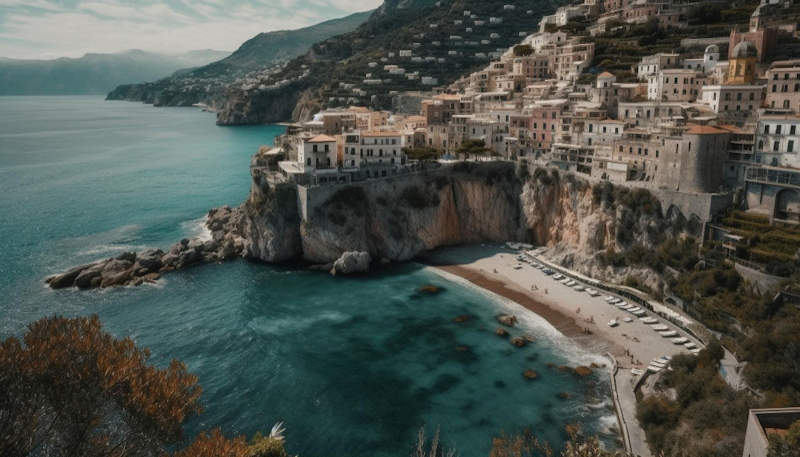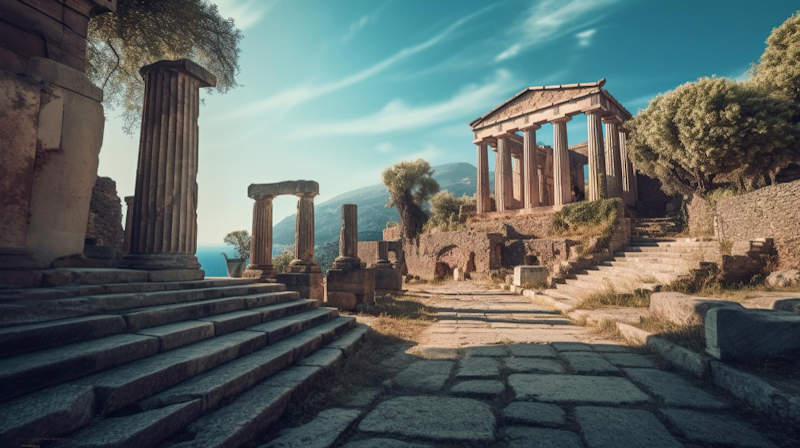Table of Contents
Introduction to Greek Yachting
Necessary Documentation and Regulations
Best Times to Sail in Greece
Popular Greek Yachting Destinations
Navigational Tips and Hazards
Cultural Etiquette and Tips
Culinary Delights Aboard and Ashore
Luxury Services and Amenities in Greek Marinas
Ancient Ruins and Historical Sites Accessible by Yacht
Eco-friendly Yachting in Greece
Emergency Protocols and Safety
Introduction to Greek Yachting
The Allure of the Aegean and Ionian Seas:
Greek waters have long been a paradise for yachting enthusiasts. From the azure stretches of the Aegean Sea to the gentle waves of the Ionian Sea, Greece’s unique topography makes it one of Europe’s prime yachting destinations.
Major Marinas and Their Facilities:
Greece boasts numerous marinas that cater to luxury yachts. Some of the prominent ones include:
- Marina Zeas in Piraeus: Located near Athens, it’s often the starting point for many yachts. It offers modern facilities, easy access to the Saronic Gulf, and is close to major Athenian landmarks.
- Flisvos Marina: Also located in the Athens area, this marina is renowned for its luxury services and is frequented by some of the world’s most opulent yachts.
- Gouvia Marina in Corfu: This marina is a gateway to the Ionian Sea, offering splendid sceneries and top-notch amenities.
Yacht Clubs and Sailing Communities:
Greece’s yachting community is vibrant and welcoming. Clubs like the Hellenic Yacht Club and the Nautical Club of Thessaloniki host regular events, regattas, and offer training programs for those interested in sailing.
Key Destinations to Anchor:
Beyond the marinas, Greece is dotted with islands and coastal towns that make perfect yachting destinations. From the whitewashed buildings of Santorini to the historical richness of Rhodes, there’s a myriad of places to explore and enjoy.
Necessary Documentation and Regulations
Essential Documents for Yachting:
Before setting sail in Greek waters, one must ensure that all documentation is in order. This typically includes:
- Yacht Registration
- Proof of Ownership or Charter Agreement
- Passports for all onboard
- Crew List
- Insurance Certificates
- If required, a visa for non-EU nationals
Permits and Special Requirements:
Certain areas in Greece, especially those near archaeological sites or military zones, might require special permits. It’s crucial to plan the route in advance and obtain the necessary permissions.
Maritime Regulations and Etiquette:
Upon entering Greek waters, yachts must first dock at a Port of Entry for customs clearance. It’s essential to respect maritime traffic regulations, especially in busy channels or near ports.
Furthermore, Greece places a strong emphasis on environmental protection. Thus, yachts should be equipped with waste holding tanks, and disposal should be done at designated facilities.
Best Times to Sail in Greece
Understanding the Sailing Seasons:
Greece experiences a Mediterranean climate, characterized by mild winters and warm, dry summers. The primary sailing season begins in April and winds down in October, with the peak months being July and August. These months offer long daylight hours, steady winds, and warm sea temperatures, making them ideal for yachting.
Weather Patterns to Watch For:
While summer is predominantly calm, sailors should be wary of the Meltemi wind, especially in the Cyclades. This wind can be quite strong, typically arising in July and August, and can make sailing challenging, especially for less experienced yachters. Conversely, the Ionian Sea is milder during these months and is often preferred by those looking for calmer waters.
Key Events Influencing Your Visit:
Numerous festivals and events take place throughout Greece year-round. The Athens & Epidaurus Festival in summer showcases theater, dance, and music events. Additionally, many islands have local feasts and celebrations which can add to your sailing experience but also mean busier ports. It’s advisable to check the local calendar of events for each destination to either join the festivities or avoid crowded periods.
Popular Greek Yachting Destinations

Sailing to the Stars: Iconic Islands and Ports:
- Mykonos: Known as the ‘Ibiza of Greece’, Mykonos boasts vibrant nightlife, stunning beaches, and a charming old town. The marinas here can get quite busy during peak seasons, so it’s advisable to book in advance.
- Santorini: Recognized globally for its dramatic sunsets, caldera views, and unique architecture. The island doesn’t have major marinas but offers several protected anchorages.
- Rhodes: A blend of history and beach life, Rhodes offers medieval sites and crystal-clear waters. Mandraki Marina is the primary docking point for yachts visiting the island.
- Crete: Greece’s largest island, it offers diverse experiences from the ancient ruins of Knossos to the pristine beaches of Elafonissi.
- Ionian Islands: Including Corfu, Zakynthos, and Lefkada, these islands provide a gentler sailing experience compared to the Aegean, with lush landscapes and famous beaches like Navagio in Zakynthos.
Hidden Havens: Lesser-Known Retreats for Solitude Seekers:
- Folegandros: Located near Santorini, this island is less touristy but equally charming with its cliff-top Hora and untouched beaches.
- Symi: Renowned for its neo-classical architecture and serene bays, Symi is a quiet alternative to the busier Dodecanese islands.
- Nisyros: A volcanic island, it offers hot springs, ancient ruins, and the unique experience of walking inside a volcanic crater.
- Ithaca: Legendary home of Odysseus, it’s quieter than its neighbor, Kefalonia, and offers tranquil bays and traditional villages.
Navigational Tips and Hazards
Mastering Key Navigational Routes:
Greece has a complex archipelago, and understanding the major routes is crucial for safe sailing. The Cycladic route, for instance, is famous for island hopping between Mykonos, Santorini, and nearby islands, while the Ionian route offers a journey through Corfu, Zakynthos, and Lefkada. It’s advisable to have updated nautical charts, either digitally or in paper form, and regularly consult them during navigation.
Identifying Potential Hazards:
- Shallow Waters: Areas like the Small Cyclades are known for their shallow waters. Always keep an eye on the depth sounder, and in uncertain areas, assign a lookout to watch for submerged rocks.
- The Meltemi Winds: Predominantly affecting the Aegean during July and August, these northerly winds can be fierce. It’s essential to monitor weather forecasts and be prepared to adjust routes or seek shelter if they intensify.
- Busy Harbors: During peak season, popular destinations can become congested. Extra caution is required when mooring, and in some cases, it might be preferable to anchor in quieter bays and use the tender to go ashore.
General Safety Tips:
- Ensure the yacht is equipped with essential safety equipment like life jackets, flares, and first-aid kits.
- Attend to regular maintenance checks, especially if embarking on longer journeys.
- Keep a VHF radio operational and regularly check for local marine updates or warnings.
Cultural Etiquette and Tips
Understanding the Greek Welcoming Spirit:
The Greeks are known for their ‘Philoxenia’ or love of strangers. It’s a deep-rooted tradition of hospitality, where guests are treated with immense respect. Returning this warmth with gratitude and politeness will enhance your experience in Greece.
Respecting Traditions and Customs:
- Religious Observance: Greece is predominantly Orthodox Christian. When visiting churches or monasteries, dress modestly by covering shoulders and avoiding short skirts or shorts. It’s also customary to show respect by standing still during religious processions.
- Greetings: A firm handshake is a common form of greeting. Close friends might greet with a hug or a kiss on both cheeks.
- Tipping: While not obligatory, it’s appreciated. In restaurants, a tip of 5-10% is standard for good service.
Engaging in Local Festivities:
If visiting during a local festival or celebration, participate with an open heart. Whether it’s dancing during a local panigiri (festival) or tasting traditional dishes during Easter, engaging authentically with local customs enriches the travel experience.
Being Environmentally Conscious:
Greece, with its pristine waters and beautiful islands, is a treasure. Ensure that you leave no waste behind, especially in the waters, and try to support local businesses to promote sustainable tourism.
Culinary Delights Aboard and Ashore

The Pillars of Greek Cuisine:
Greek food is characterized by its use of fresh ingredients, Mediterranean spices, and age-old recipes. Staples include olive oil, fresh vegetables, fish, and meats, often seasoned with herbs like oregano, rosemary, and thyme.
Must-Try Dishes:
- Moussaka: A delectable layered dish made of eggplant, minced meat, potatoes, and topped with creamy béchamel sauce.
- Souvlaki: Skewered and grilled meat (often pork or chicken) served with pita bread, tomatoes, and tzatziki sauce.
- Spanakopita: A savory pie filled with spinach, feta cheese, and herbs wrapped in flaky phyllo pastry.
- Octopus: Whether grilled, stewed, or served in a vinaigrette, this seafood delicacy is a staple in coastal regions.
Regional Specialties:
Different regions have their own unique dishes:
- Crete: Known for Dakos, a hard bread topped with tomatoes, feta, and herbs.
- Santorini: Renowned for its cherry tomatoes and white eggplants, often used in local salads and dishes.
- Corfu: Try Pastitsada, a spicy meat or rooster dish served with pasta.
Provisioning Your Yacht with Local Delicacies:
When stocking up, consider adding:
- Kalamata Olives: Perfect for salads or as a snack.
- Greek Cheeses: Feta, graviera, and manouri to name a few.
- Local Wines: From robust reds to crisp whites, Greek wines are an essential addition to your culinary experience.
- Ouzo or Tsipouro: Traditional spirits that can be enjoyed as an aperitif or after a meal.
Luxury Services and Amenities in Greek Marinas
Setting the Gold Standard:
Greek marinas, especially those catering to luxury yachts, offer a range of services and amenities that rival some of the best in the world.
Facilities and Amenities:
- Berthing Services: Advanced docking facilities with power, water, and Wi-Fi connections.
- Maintenance & Repair: Many marinas have state-of-the-art dry docks and offer repair and maintenance services.
- Fueling Stations: Easily accessible and equipped to handle yachts of all sizes.
Concierge and Special Services:
Premier marinas often provide concierge services to cater to all needs, from restaurant reservations to organizing local tours. Some even offer luxury spa and wellness facilities, ensuring relaxation after a day at sea.
Shopping and Dining:
Marinas like Flisvos or Sani boast high-end boutiques, gourmet restaurants, and chic cafes. Whether you’re looking for designer wear or a taste of modern Greek cuisine, these marinas offer the best of both worlds.
Security and Privacy:
Safety is paramount. Greek marinas ensure 24/7 security with surveillance, guarded entry points, and strict privacy protocols, providing peace of mind to yacht owners and their guests.
Ancient Ruins and Historical Sites Accessible by Yacht

Gateway to Ancient Civilizations:
Greece, a land steeped in mythology and history, offers a plethora of ancient sites and ruins. Many of these are conveniently accessible by yacht, providing a unique perspective from the sea.
Key Destinations:
- Delos: Near Mykonos, this sacred island was the mythological birthplace of Apollo and Artemis. Its ruins, including temples, theaters, and iconic lion statues, are a testament to its historical importance.
- Knidos: Located at the southwestern tip of Turkey but historically tied to Greece, Knidos boasts an ancient harbor and ruins of a city that dates back to the 4th century BC.
- Akrotiri, Santorini: An ancient Minoan city preserved under volcanic ash, often referred to as the “Minoan Pompeii.”
- Athens’ Saronic Gulf: While docking at the marinas of Athens, one can easily visit the iconic Acropolis, Temple of Olympian Zeus, and the ancient theater of Epidaurus by a short land excursion.
- Epidavros: Located in the Peloponnese, the ancient theater here is renowned for its acoustics and can be reached via nearby ports.
Several of these sites, like Delos and the Acropolis, hold UNESCO World Heritage status, highlighting their global significance. Sailors are urged to treat these sites with respect, abiding by local regulations and guidelines.
Eco-friendly Yachting in Greece
Embracing Sustainable Sailing:
As Greece’s pristine waters and delicate ecosystems face increasing threats, it becomes paramount for sailors to adopt eco-friendly practices.
Preserving the Marine Environment:
- Limiting Waste: Minimize the use of single-use plastics aboard. Opt for reusable containers, cutlery, and water bottles. Ensure waste is appropriately disposed of in marina facilities or recycling centers.
- Eco-friendly Cleaning: Use biodegradable and environmentally friendly cleaning agents to prevent harmful chemicals from entering the sea.
- Mindful Anchoring: Avoid anchoring in sensitive areas like seagrass beds. Use established mooring buoys when available.
Supporting Local Economies:
- Buying Local: Provision your yacht with local products, from fresh produce to artisanal goods. This supports local communities and reduces the carbon footprint of imported goods.
- Sustainable Tours: If taking guided tours, opt for those that emphasize eco-friendly and sustainable practices.
- Promote Green Initiatives: If chartering, choose companies or services that are committed to sustainable practices, such as using renewable energy sources or engaging in marine conservation projects.
Conservation Initiatives:
Consider supporting or volunteering with local marine conservation projects. Many organizations in Greece focus on preserving marine life, protecting endangered species, and maintaining the health of the seas.
Events and Festivals for Yacht-goers
Sailing and Maritime Festivals:
- Spetses Classic Yacht Regatta: Held in Spetses, an island in the Saronic Gulf, this event attracts classic boats, yachts, and aficionados from around the world. An excellent event for yacht enthusiasts.
- Poros Yacht Show: A showcase of luxury yachts, this event in Poros offers networking opportunities, exhibitions, and parties.
- Navarino Sea Turtle Festival: Celebrated in Pylos, this festival aims to raise awareness about the conservation of sea turtles. It combines education with fun activities and boat trips.
Cultural Festivals:
- Aegean Film Festival: Held in Patmos and Paros, this festival screens international and Greek films, attracting a global audience. Perfect for yacht-goers to anchor and enjoy cinema by the sea.
- Feast of the Assumption: Celebrated on 15th August, many Greek islands hold festivities, including church services, processions, music, and dance.
- Local Panigiria: These are traditional local festivals, celebrating the patron saint or historical events of an island or town. Often involving food, music, and dance, these are a true cultural immersion experience.
Emergency Protocols and Safety
Key Emergency Contact Numbers:
- European Emergency Number: 112 (can be dialed free of charge from most mobile networks)
- Hellenic Coast Guard: +30 210 331 0000 (for maritime emergencies)
- First Aid: 166 (ambulance services)
Nearest Medical Facilities:
While major islands like Crete, Rhodes, Mykonos, and Santorini have well-equipped hospitals, it’s crucial to be aware of local medical centers when sailing through less populated areas. Always have a list of the nearest clinics or pharmacies.
General Yachting Safety Tips in Greece:
- Weather Watch: The Aegean Sea can be unpredictable. Stay updated with local weather forecasts, especially regarding the Meltemi winds in summer.
- Communication: Ensure your VHF radio is functional. Regularly check for marine updates or warnings.
- Equipment Check: Before setting sail, ensure all safety equipment, including life jackets, flares, and first-aid kits, are on board and easily accessible.
If you’re planning the trip, consider consulting specialized yachting magazines, maritime authorities in Greece, or yachting agencies that could provide more specific and updated details. Safe and enjoyable sailing!
Do you have any feedback or additional insights? Please send an email to editor @ yachtsurf.com





